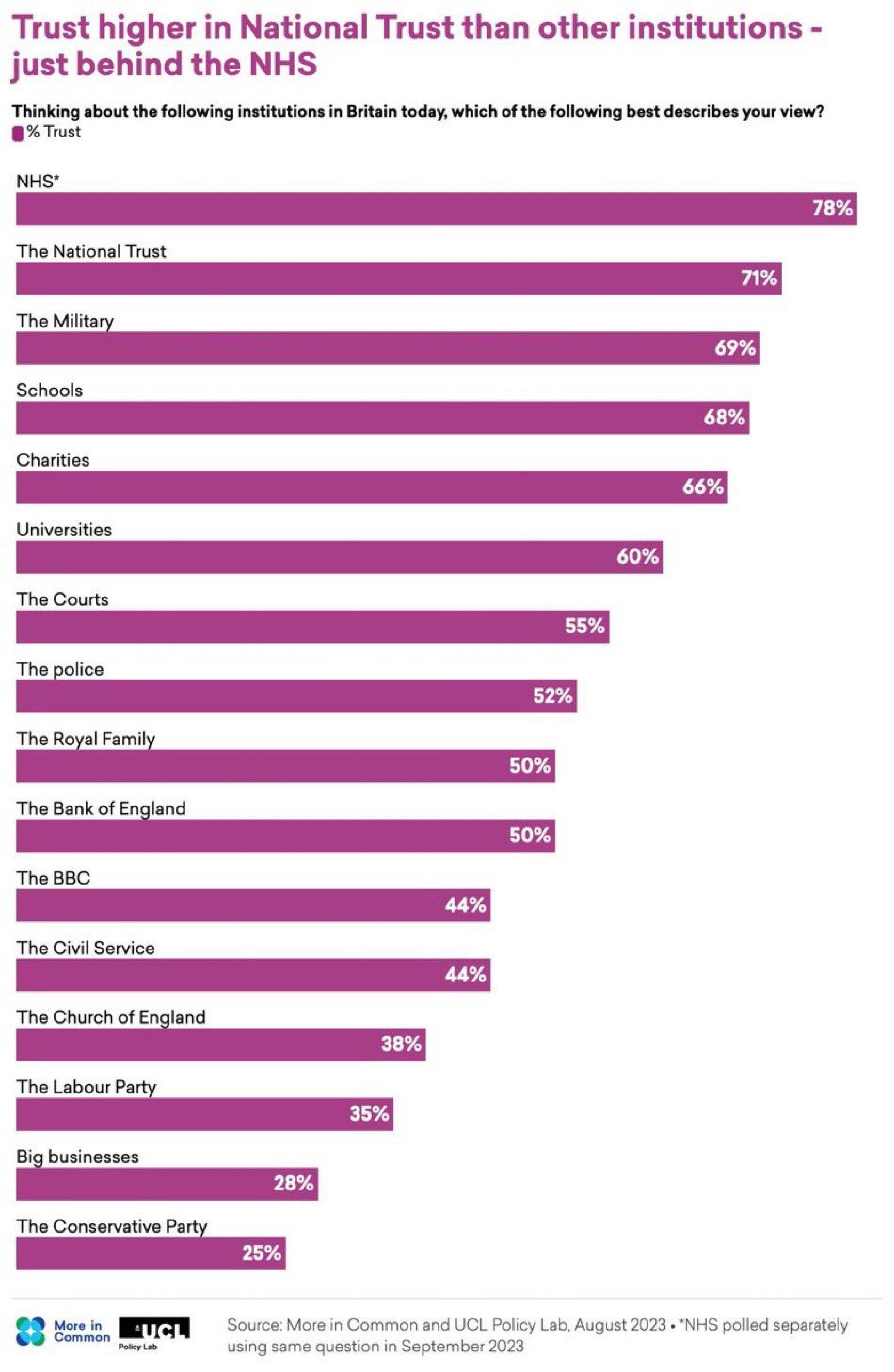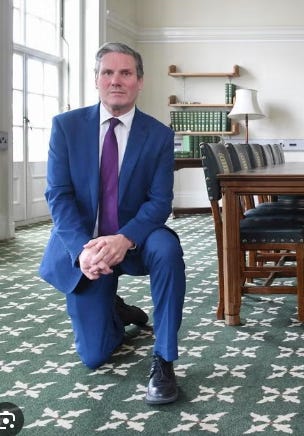I Started A Woke
How Keir Starmer is using wokeness to make the Tories look weird. Also: a new podcast, with me in it
On Monday, Keir Starmer told an outrageous lie. And worse, he told it to an audience of some of the nicest and most public-spirited people in the country. There are so many people in the world you could lie to, and so many places you could lie to them. Would you really go and lie in a church to the Civil Society Summit? Keir Starmer did. Here’s what he said, right in the middle of his speech:
“And look, I’m not here to talk about the Tories today.”
For a man who wasn’t here to talk about the Tories, Starmer spent a lot of the speech talking about the Tories. He talked about the Tories before he said he wasn’t here to talk about the Tories today, and he talked about the Tories after he said he wasn’t here to talk about the Tories today. But, to be fair to him, he spends his whole life talking about the Tories. Even when he’s not talking about the Tories, he’s talking about the Tories. Because - whether he likes it or not - talking about the Tories is the only thing he can do.
If you’re the Leader of the Opposition, you can talk about lots of things: the state of the nation, your values, your vision for the country, your policies, your views on what’s happening in the news, your favourite piece of music. But absolutely everything you say, even when you don’t want it to be, is about the other side. The state of the nation is bad, because of them. My values are these, and they don’t share them. My policies are these, and they’re better than theirs. My views on this news story are these, and they don’t agree. My favourite piece of music is this, and they have terrible taste in music. You don’t always say the second bit, but your audience always hears it. Because your whole argument is: they are in charge, and they are doing a bad job, and I should be in charge, and I would do a better job.
Sometimes, to be fair, you’re doing the opposite of contrast. “My favourite record is Rule Britannia, and their favourite record is Rule Britannia, and so you can’t try to claim I’m less patriotic than them”.1 But even then, you’re talking about them as much as you’re talking about you.
If you can’t say anything without talking about the Tories, and you don’t want to talk about the Tories, there’s only one option available: don’t talk at all. And for a long time, on a number of issues, that has been Keir Starmer’s strategy. In particular, it has been his strategy on a range of things that some people like to put in a box marked “woke”.
“Woke” is an annoying term that is hard to define while possessing an I-know-what-you-mean quality.2 Its meaning can expand and contract - even those who feel comfortable using it would find it hard to defend the description of some things as “woke”, and even those who object to the word may very well be comfortable with at least some of the beliefs it is used to describe. And while it is a term which has its origins, and some continued defenders, on the left, it has now basically become a right-wing boo-word for a constellation of beliefs and issues that might once have been described as “politically correct”: a right-wing caricature of leftism which, like all caricatures, has its roots in truth but which, like all caricatures, is not real.
There are plenty of people on the right who have been very keen indeed to talk about “woke”: partly as a framing device for various examples of crazy “what’s the world coming to” challenges to small-c conservatism which really do make for fun news items and talking points, and partly to try to define their political opponents as obsessed with crazy left-wing beliefs from way outside the mainstream.
Meanwhile, from the point of view of parties of the mainstream centre-left, “woke” is a third rail that they don’t want to touch. That’s why, broadly speaking, Keir Starmer has tried to stay out of it.3 But not this week, and not in this speech to the Civil Society Summit, hence this Daily Mail front page:
Here’s Starmer, just after saying he’s “not here to talk about the Tories today”, talking about the Tories:
They’ve got themselves so tangled up in culture wars of their own making, that instead of working with the Royal National Lifeboat Institution, an organisation the late Queen was patron of for 70 years, to find real solutions to stop the small boats. Their rhetoric has helped demonise them.
Instead of working with the National Trust so more people can learn about – and celebrate – our culture and our history, they’ve managed to demean their work.
In its desperation to cling onto power at all costs, the Tory Party is undertaking a kind of weird McCarthyism, trying to find woke agendas in the very civic institutions they once regarded with respect.
Let me tell you. Waging a war on the proud spirit of service in this country isn’t leadership. It’s desperate. It’s divisive. It’s damaging.
It comes to something when the Tories are at war with the National Trust. That’s what happens when politics of self-preservation prevail over commitment to service.
Look, I like this stuff, and not just because (full disclosure) I’m a member of the National Trust and my mum is a National Trust volunteer.4 It’s risky, but it’s not as risky as it looks. It’s risky, because it just does lead to Daily Mail front pages like that one - although so do most things Keir Starmer does, so it seems better to price it in than to worry about it. But it’s not as risky as it looks, because Starmer isn’t defending woke in general,5 but specific institutions whose behaviour has been characterised by some on the right as “woke” but which have trust ratings the Conservative Party would kill for including, we can assume, among Daily Mail readers:
As Sunder Katwala notes, there is overwhelming support for the idea that the National Trust should educate visitors to its places about their links to slavery and colonialism (something which looks to me to be perfectly in line with former Culture Secretary Oliver Dowden’s demand for cultural institutions to “retain and explain”, but which turns out not to be for some reason):
The Guardian’s analysis of the speech explains what Labour wants to say Starmer is doing here:
His speech was also symbolic of a broader strategy from Starmer, who has been looking for opportunities to flip the narrative and show that he is not just ducking fights with the Conservatives to deny them electoral dividing lines, as some of his critics suggest…
Labour strategists believe Starmer’s willingness to take on the Tories – even if defending the National Trust might not seem the riskiest of tactics – flies in the face of claims he is reluctant to do so for fear of it being weaponised at the election.
“We always knew that the final year before an election would be about picking sides on things,” one senior aide explained. “It’s not really about the individual rows: we’re trying to tell more of a story about what the party stands for.”
This is right as far as it goes. But the fact that this is happening in the last year before an election is not just a pivot towards making more confident arguments as the campaign proper gets underway. The comparative silence in the years preceding the election is an integral part of what makes the more confident arguments work now. Because when the Labour Party doesn’t get involved in defending woke directly, people who want to take on woke have to point at and argue against things that aren’t the Labour Party. And things that are more popular - and more normal - than the Labour Party.
Tory lines on woke are all about how weird and alien woke beliefs and woke institutions and woke people, and Labour by extension as their political arm, are. But to make that argument, they and their media outriders have to keep talking about woke, and finding new woke things to talk about, and expanding the definition of woke until it includes institutions like the RNLI and the National Trust. Talking about woke all the time might be a good business model for GB News or the Daily Mail, but for a mainstream political party it’s weird. Slagging off trusted, popular institutions like the RNLI and the National Trust is weird. The Tories, it turns out, are weird. They’ve played themselves.
For years, when they tried to turn the conversation to all matters woke, Keir Starmer wasn’t here to talk about the Tories. And now, all he has to do is point.
The Election Tricycle: a new podcast
2024 isn’t just the year (probably) of the UK election: it’s the year of elections in 76 countries, including eight out of the ten most populous countries in the world. Over four billion people - more than half the world’s population - will have the chance to vote this year.
I’m part of a new podcast that’s going to look in detail at three of 2024’s elections: the Indian election, the US election and the UK election. The Election Tricycle, with US journalist Emily Tamkin, Indian journalist Rohan Venkat, and me, will look at some of the biggest stories in those three elections, and explore some of the similarities and differences and connections and overlaps between them.
In the first episode we talk about the Republican primaries and the departure of Ron DeSantis, Narendra Modi’s inauguration of the Temple of Ram in Ayodhya, and (it’s been a slower political news week in the UK) Simon Clarke’s attempt to topple Rishi Sunak. You can listen to it, and subscribe to it, on Apple, or on Spotify, or via this Podfollow link. Please listen, subscribe, tell your friends and family, and tell us what we should be covering next week.
Also, we all have Substacks. You’re reading mine already, and you can also read Rohan’s India Inside Out and Emily’s ET Write Home.
The dog that didn’t whistle
A couple of weeks ago, I mentioned a controversy over whether Keir Starmer’s attack on Rishi Sunak at PMQs as “a Prime Minister who just doesn’t get Britain” was a dog-whistle racist attack. I said then that although I certainly didn’t believe that it was intended as such, the use of the phrase made me wince a bit. It would therefore be remiss of me not to note two things.
First, that in his Telegraph article launching what turned out to be a one-man coup against Rishi Sunak this week, Simon Clarke said that Sunak’s “strengths cannot compensate for two fundamental problems. He does not get what Britain needs. And he is not listening to what the British people want”.
And second, that although Clarke was very strongly criticised by many people on his own side (and supported, so far as I can see, by none of them), nobody at all appears to have accused him of making a dog-whistle racist attack, even though he couched his criticism in pretty much identical terms to those they objected to so strongly when Starmer used them.
I don’t believe, just to be clear, that Clarke was making a racist attack either. But… you’d think the people who noticed Starmer last week might notice Clarke this week, wouldn’t you?
This is emphatically not a direct quote from Keir Starmer. Keir Starmer’s favourite piece of music (well, one of his favourite pieces of music) is Ode To Joy, which the Tories genuinely tried to use as evidence of his lack of patriotism and commitment to Brexit.
James O’Malley had a decent go at defining “woke” a while back, and you should read his post. I feel almost obliged to say that I’m not sure I agree with everything in it, but a) that should be implicit from the fact that someone else wrote it; and b) not being sure whether you agree with something is the opposite of a reason not to read it.
This week, Sun political editor Harry Cole mocked someone’s claim that “Despite a frequent tentativeness about being drawn into cultural issues, Starmer approached the subject with aplomb”, by posting “Ah yes, that famous ‘frequent tentativeness’...” and this photo of Starmer taking the knee.
But that makes the opposite point from the one Cole wants to make. The photo is from June 2020, three and a half years ago (The Sun’s coverage of it is pretty straight, and also notes Boris Johnson’s acknowledgement that the concerns of anti-racist protesters are “founded on a cold reality”), and there’s a reason Cole didn’t produce a more topical example: there isn’t one, because this stuff is infrequent. The same point applies to Allison Pearson’s piece in the Telegraph this week, about the same photo, headlined If there’s a more embarrassing Opposition photo than this, I’ve yet to see it: what it reveals is that she has yet to see a more embarrassing Opposition photo than one taken three and a half years ago. Whatever the rights and wrongs of the symbolism of taking the knee on the day of George Floyd’s funeral, it’s clear that Starmer’s team now view it as a mistake, and equally clear that the Tories do too. See for example Rishi Sunak at this week’s PMQs describing Starmer as “the man who takes the knee, who wanted to abolish the monarchy, and who still does not know what a woman is”. They’d love Starmer to take the knee every week. But he doesn’t.
Fountains Abbey. It’s lovely. You should go. Say hi to my mum.
One of the problems with “woke” as a concept is that it is quite literally impossible to imagine what it would mean to defend woke in general.









I agree with the thrust of your piece in that Conservatives and their friends in the press will look increasingly deranged if they lambast Britain's fustiest institutions as woke – although as looking increasingly deranged seems to have been the strategy for the past few years, perhaps we shouldn't discount it.
But on a wider point, I don't think ‘woke’ is that hard to define, or at least it's not much harder than concepts like conservatism and liberalism. Yes, there is a wider, sillier use of the word that encompasses things like recycling. And there is a narrower version that includes things like micro aggressions. But the fact that everyone knows Nigel Farage isn't woke indicates that's is meaningful a political designation as any.